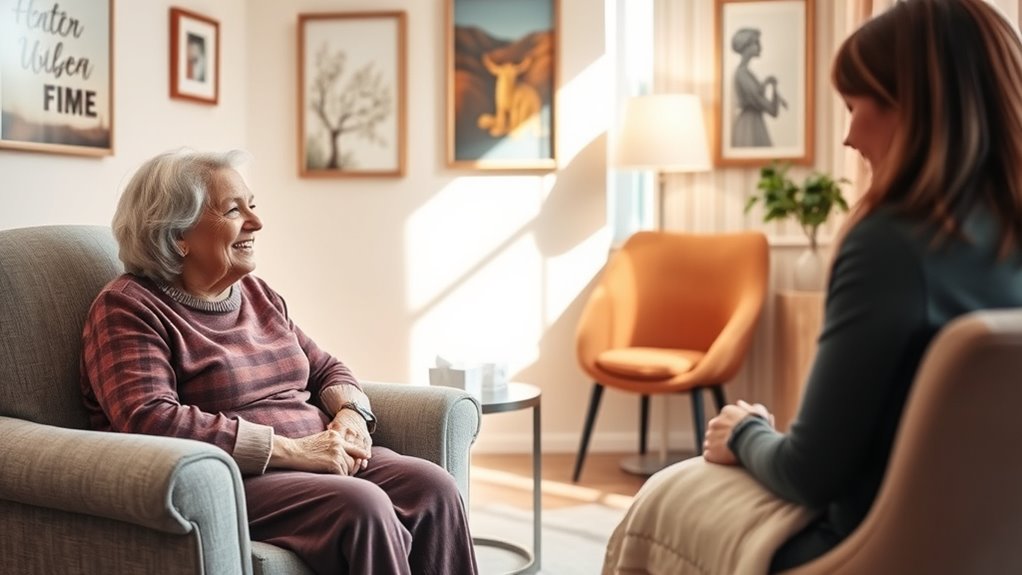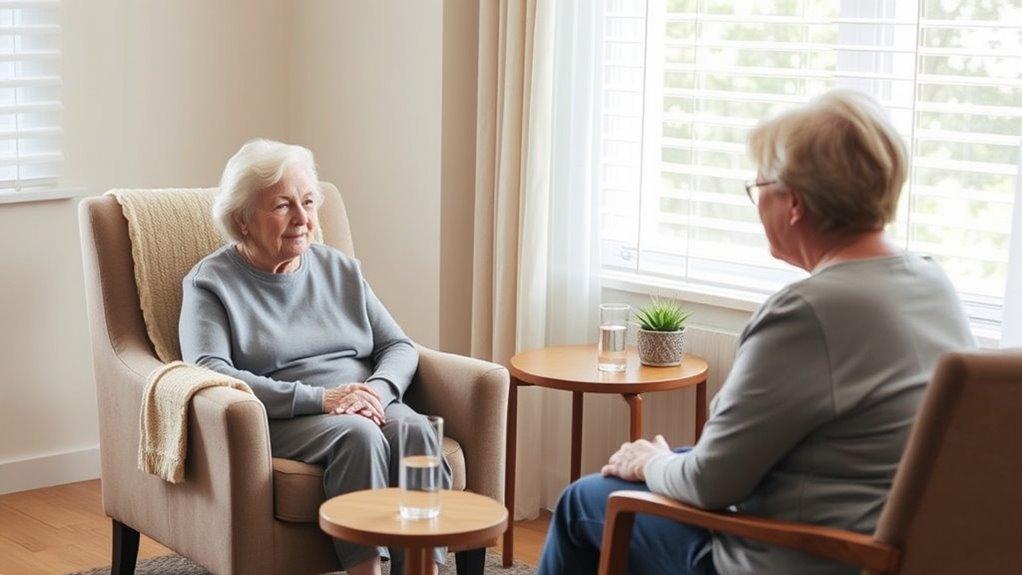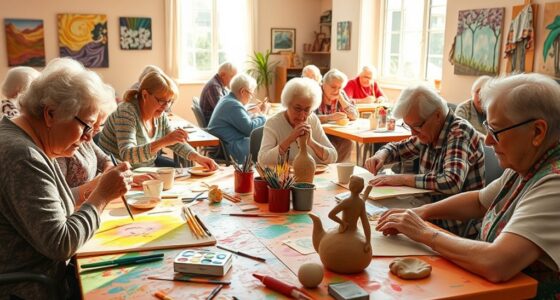Breaking the stigma around mental health for older adults is essential to help you access the support you need. Many believe therapy is only for younger people or crises, but it actually offers valuable tools for managing loneliness, loss, and health concerns. Seeing mental health as just as important as physical well-being encourages you to seek help confidently. If you keep exploring, you’ll discover more ways to embrace mental wellness at any age.
Key Takeaways
- Educating older adults about mental health benefits reduces misconceptions and encourages seeking therapy as a positive, proactive step.
- Challenging stereotypes that therapy is only for crises helps normalize mental health support for aging individuals.
- Promoting stories of older adults who benefit from therapy can inspire acceptance and reduce stigma.
- Integrating mental health education into community programs fosters awareness and destigmatizes counseling.
- Emphasizing therapy’s role in enhancing quality of life and emotional resilience encourages older adults to seek support confidently.

As the population of older adults continues to grow, understanding the unique counseling and therapy needs of this group becomes increasingly important. Many seniors face mental health challenges, yet the stigma surrounding mental health often prevents them from seeking help. Raising mental health awareness is essential to break down these barriers, so you recognize that seeking support is a sign of strength, not weakness. You might think that therapy is only for younger people or those facing crises, but aging brings its own emotional hurdles—loss of loved ones, health issues, and feelings of loneliness—that can be effectively addressed through counseling. When you understand the importance of mental health awareness, you start to see therapy as a valuable resource rather than a taboo. Additionally, incorporating essential oils for mental well-being can serve as a complementary approach to support emotional health and relaxation during therapy or daily self-care routines.
Understanding older adults’ mental health needs helps break stigma and promotes well-being at any age
Social support plays a fundamental role in maintaining mental well-being for older adults. Having a strong network of friends, family, or community groups can considerably reduce feelings of isolation. If you’re feeling lonely, reaching out to trusted friends or joining social activities can provide the emotional cushion you need. Therapy often enhances your social support system by offering a safe space to express feelings and work through complex emotions. It’s not just about addressing mental health concerns; it’s also about fostering connections that improve your overall quality of life. Your social environment can influence how you cope with aging and mental health struggles, so strengthening these relationships is essential.
Many older adults hesitate to seek counseling because they believe mental health issues are just a natural part of aging or that they should handle problems on their own. This misconception discourages many from getting the help they deserve. Yet, therapy can help you develop coping skills, improve self-understanding, and manage symptoms of depression, anxiety, or grief. By actively engaging in mental health awareness, you acknowledge that mental health is just as important as physical health. Taking this step can lead to greater resilience and a happier, more fulfilling retirement or later years.
Ultimately, breaking the stigma around counseling for older adults involves education and challenging stereotypes. You need to see mental health support as a positive intervention that can improve your well-being and help you navigate life’s changes. Connecting with mental health professionals and building a supportive social network allows you to embrace aging with confidence and emotional strength. Remember, seeking help is a proactive choice that can transform your experience of aging, making it more engaging, connected, and mentally healthy.
Frequently Asked Questions
How Can Therapy Improve Quality of Life in Late Adulthood?
Therapy can considerably improve your quality of life in late adulthood by strengthening your emotional well-being and boosting elderly resilience. It helps you process grief, adapt to changes, and manage mental health challenges. Through counseling, you gain coping strategies and a supportive space to express feelings. This empowers you to face aging with resilience, stay emotionally balanced, and enjoy a more fulfilling, connected life during your later years.
Are There Specific Counseling Approaches Tailored for Seniors?
Think of therapy for seniors as a tailored suit—designed to fit their unique needs. You’ll find approaches like cognitive therapies, which help reframe negative thoughts, and life review, where they reflect on meaningful memories. These strategies act as guiding lights, helping older adults navigate life’s changes with confidence. By customizing therapy, you support their mental well-being, making the journey of aging smoother and more fulfilling.
What Are Common Mental Health Challenges Faced by Older Adults?
You might notice that older adults often face mental health challenges like depression, anxiety, and grief. These issues can be intensified by social isolation or health problems. To support them, focus on stigma reduction and encourage peer support, which helps normalize mental health discussions. By creating a safe space, you empower seniors to seek help, improving their well-being and fostering a stronger sense of community.
How Can Families Support an Aging Loved One in Therapy?
Imagine changing your loved one’s entire world with just your support! You can do this by actively engaging in their therapy journey, offering consistent emotional support, and encouraging family involvement. Attend sessions if allowed, listen without judgment, and show patience. Your unwavering presence can break barriers, boost their confidence, and help them feel less alone. Together, you create a powerful foundation that promotes healing, resilience, and a renewed sense of hope.
Is Therapy Effective for Managing Grief and Loss in Older Age?
You might wonder if therapy helps with grief and loss in older age. Grief counseling is often very effective, providing a safe space to process feelings and manage loss. Through targeted loss management techniques, you can find relief, develop coping skills, and gradually move forward. Remember, seeking support shows strength, and therapy can be a crucial step in healing during tough times, especially after significant life changes.
Conclusion
Just like Athena’s wisdom guided ancient heroes, your willingness to seek counseling can illuminate your path through life’s challenges. Breaking the stigma isn’t just about you; it’s about paving the way for others to find strength and support. Embrace therapy as a beacon of hope, proving that age is no barrier to growth. Remember, even the greatest sages knew that seeking help is a mark of true courage and self-awareness.









